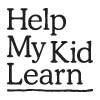What to do with this activity?
1. Talking about numbers in everyday life helps your child’s fluency in counting, estimating and understanding numbers. For example:
- “How many have we for dinner today?”
- “How many eggs are left in the fridge?”
- "How much change is left in my purse?"
2. Keep a small change jar so your child can sort and count coins.
3. A small amount of money helps develop your child’s money skills. They learn the names of the coins and what they are worth. Knowing what change you get is a lesson in subtraction.
4. Children learn to use a calculator in 4th class but younger children love to make big numbers. Show your child zero and let them make millions!
-
Why am I doing this?
Children learn numbers and maths in a natural way through play and everyday activities. It’s different to school and should always be fun and practical – that way your child will enjoy working with numbers.
Your child also develops a sense of patterns and what time means in everyday life. This is important for helping your child to manage everyday activities – going places, how long they have to wait and understanding when things will happen in the future.
-
How can I do more?
Talking about numbers helps your child’s fluency in counting, estimating and understanding numbers and money in everyday life. It takes time for children to understand addition and subtraction so use objects when helping them understand this or when doing their homework.
Rate this activity
![]()
![]()
![]()
![]()
![]()
Based on 3 reviews
How would you rate it?
1 = Poor, 5 = Great.



